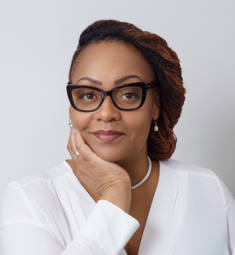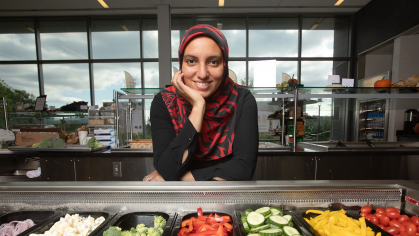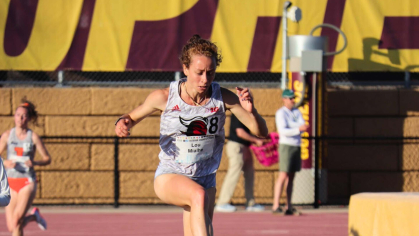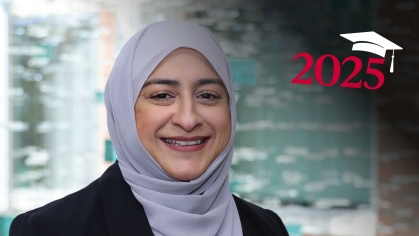Denise Anderson, M.P.H., Ph.D., is the inaugural Executive Director of the Center for Health Equity & Wellbeing – New Jersey’s Public Health Institute. She’s also a part of the Rutgers School of Public Health’s Class of 2007.
We sat down with Anderson - an accomplished executive and public health practitioner with a diverse and extensive background spanning multiple sectors, including hospitals, state and federal governments, for-profit and non-profit organizations, and academia - to chat about her career journey, as well as, her new role with the Center for Health Equity & Wellbeing!
What did you study?
I'm a Jersey girl from Newark with a bachelor's degree in Human Ecology with a concentration in dietetics from the University of Maryland Eastern Shore. I became a registered dietitian after completing my dietetic internship at Saint Elizabeth University (formerly the College of St. Elizabeth).
My career began as an area manager for Newark Public Schools, overseeing menu planning and compliance with child nutrition requirements for about 10 schools. In 2007, I received my Master of Public Health (M.P.H.) degree in Urban Health Administration from the Rutgers School of Public Health, followed by my doctorate in 2021 through a joint Urban Systems program with Rutgers University and the New Jersey Institute of Technology.

How did your career evolve from being a Clinical Dietitian to a public health practitioner?
When I first became a Registered Dietitian, I began working at University Hospital in Newark in the general medicine/HIV and trauma units. This experience opened my eyes to health disparities, as I noticed a disproportionate number of Black and Brown residents in both units. Later, I moved to an ambulatory position at New Jersey Medical School's infectious disease practice, focusing on people with HIV.
A pivotal moment occurred during a nutritional assessment with a client who revealed they had eaten a meal from a dumpster beside the shelter where they slept the previous night. This experience made me realize I needed to address broader issues beyond nutrition, such as housing and economic stability. It prompted me to shift my focus to public health and pursue an M.P.H. to learn more about the social determinants that significantly impact health.
How did your experience at the Centers for Disease Control and Prevention (CDC) shape your career?
After completing my M.P.H., I was selected for the CDC's Public Health Prevention Specialist Fellowship. This highly competitive three-year program included two six-month rotations in Atlanta and a two-year deployment to the Los Angeles County Department of Health. I worked on HIV prevention, focusing on non-occupational post-exposure prophylaxis for high-risk populations. Additionally, I worked on connecting recently incarcerated people with HIV to care to keep the community's HIV viral load at a minimum.
Working at various health departments was my first opportunity to work at a population level on the systems and services that mitigate risks and enable protective factors that affect communities and their health journeys.
What roles did you take on after returning to New Jersey?
Upon returning to New Jersey, I focused on project management in public health. I ran nationally funded programs through the Health Resources and Services Administration and reestablished the HIV prevention program at University Hospital in Newark. Later, I wanted to broaden my expertise as a public health generalist, working on various projects, including patient-centered medical homes and consulting for healthcare entities.
I worked at the New Jersey Department of Health for about two and a half years, including during the first year and a half of the COVID-19 pandemic. I established the department's first rapid mobile response team, which took a regional approach to provide COVID-19 testing, contact tracing, social support, and later, vaccine distribution. I advocated strongly for health equity, ensuring that all three available vaccines (Pfizer, Moderna, and J&J) were offered to combat mistrust and provide choice.
Tell us about your new role as Executive Director at New Jersey's first Public Health Institute.
The Center for Health Equity and Well-Being is New Jersey’s first public health institute—and the first in the nation to have health equity as a founding priority. It’s also unique because it’s a nonprofit that works hand-in-hand with governmental agencies, the private sector, other non-profits – and most importantly, the community. The center’s focus on equity and addressing health disparities aligns perfectly with my career. Given my experience and what my life's work has been to date, it felt like a natural fit. I believe I have what it takes to get the center off the ground and help it fulfill its mission and vision.
The most pressing public health challenge in New Jersey is ensuring our public health infrastructure is prepared for future epidemics or pandemics. I'm reviewing the nearly 1,000-page Independent Review of New Jersey’s Response to the COVID-19 Pandemic and other resources as we develop the strategic plan for the institute.
I look forward to developing and implementing the strategic plan to meet the organization's mission and vision and support its independence and fiscal solvency. Further, I am enjoying meeting with the institute’s collaborators and partners, including, but not limited to, the CEOs and Executive Directors of public health institutes in other states, the institute’s board of trustees, and our other stakeholders – community members, and public, private, and non-profit entities.
What advice do you have for current Rutgers School of Public Health students?
As people working in public health, we must be passionate as we will encounter many hurdles. I also always encourage students to be open to gaining diverse experience in all facets of our profession by progressing through various roles and positions. Doing this helps develop a cadre of transferable skills - even if they are coming from volunteer experiences. I also believe in being a lifelong learner and staying coachable, especially in public health, which is always evolving. Finally, don’t be afraid to say ‘yes’ to new opportunities that may not always fit in your job description but will give you the chance to gain a new skill or experience.


